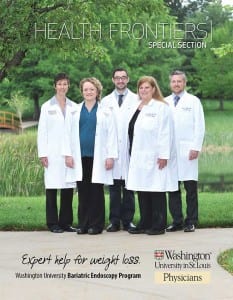Weight loss can be a tricky business. Anyone who’s ever been ‘on a diet’ knows that. For some, losing a few pounds and keeping them off works. For others, it’s a lifelong process of up-and-down fluctuations necessitating different wardrobes and posing serious health threats. But Washington University weight loss specialists are offering a new nonsurgical program, which, over the past year, has made a significant difference in the lives of many overweight people. The bariatric endoscopic procedure—which uses an intragastric balloon to induce feelings of satiety—is designed for women who are 10 to 50 pounds overweight and men with excess weight of between 20 and 70 pounds. It is not meant for the chronically obese for whom gastric bypass surgery, gastric banding or laparoscopic sleeve gastrectomy might be necessary.
Dr. Vladi mir Kushnir, Washington University gastroenterologist, explains that the balloon system is designed to kickstart a weight loss initiative and other lifestyle changes. The balloon stays in place for six months, but the complete 12-month program offered by Washington University Physicians includes life coaching, behavioral counseling and nutrition education, with the goal of effecting lifelong changes in diet. “Our aim,” says Kushnir, “is to help with initial weight loss and teach healthier eating habits. Patients get used to eating smaller meals because they feel fuller, and they learn ways to manage their weight moving forward.”
mir Kushnir, Washington University gastroenterologist, explains that the balloon system is designed to kickstart a weight loss initiative and other lifestyle changes. The balloon stays in place for six months, but the complete 12-month program offered by Washington University Physicians includes life coaching, behavioral counseling and nutrition education, with the goal of effecting lifelong changes in diet. “Our aim,” says Kushnir, “is to help with initial weight loss and teach healthier eating habits. Patients get used to eating smaller meals because they feel fuller, and they learn ways to manage their weight moving forward.”
During the outpatient endoscopic procedure, a deflated balloon (made of a soft plastic) is inserted through the mouth and into the stomach by endoscope and inflated to the size of a small melon with salt water. “The procedure is very straightforward,” Kushnir says. It takes between 5 and 15 minutes, and patients usually can return to work in a few days. He says studies show that three years after balloon insertion, a reduction in the original starting weight is maintained. Since the device’s FDA approval last year, Washington University physicians have performed 40 procedures, with less than 5 percent of patients experiencing major complications, Kushnir says.
Bariatric endoscopy currently is not covered by insurance. “Including device placement, removal, dietary intervention and lifestyle coaching, the entire 12-month program can cost between $7,100 and $7,600,” he says. Candidates include those who: have attempted weight loss through diet and exercise without success; have not had previous surgeries in the small intestine or stomach; are not on blood thinners; and are age 22 and above.
Kushnir adds that Washington University is currently involved in clinical research on emerging technologies in this field, in particular a new swallowable capsule that contains a balloon inflated with nitrogen gas through an attached tube. It is expected to be on the market within a year.
Pictured: Dr. Vladimir Kushner
Photo: Bill Barrett
The Washington University Bariatric Endoscopy Program is offered at the Barnes-Jewish West County Hospital campus at 1020 N. Mason Road in Creve Coeur. For more information, call 314.362.2652 or visit barnesjewishwestcounty.org/nonsurgical-weight-loss. Cover provided by Washington University Physicians | Cover photo by Bill Barrett








